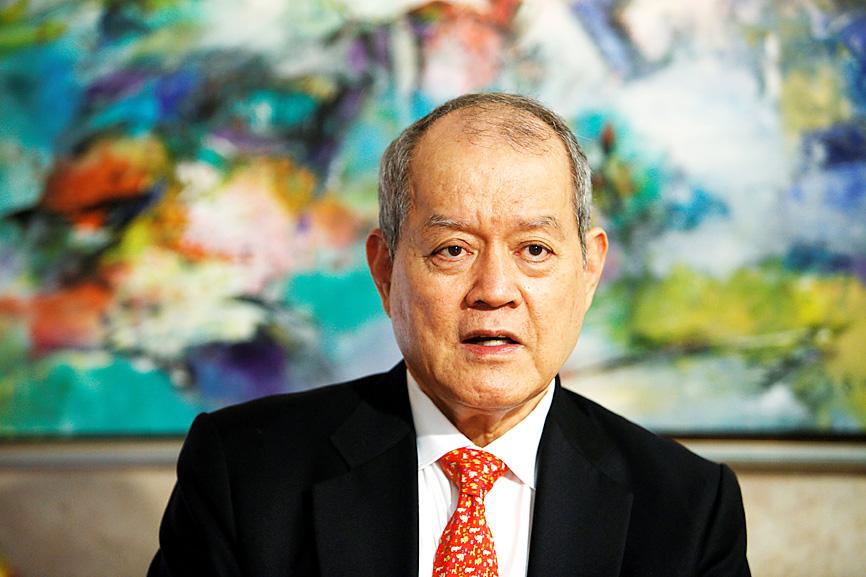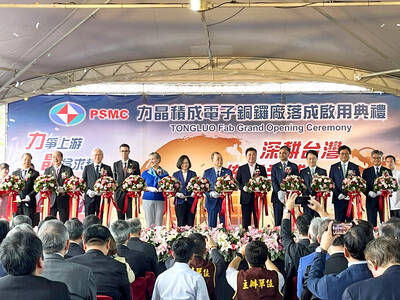Bank of China Ltd (中國銀行) has sued BP PLC in Singapore over its alleged role in fabricating oil deals with collapsed trader Hin Leong Trading Pte Ltd (HLT, 興隆貿易), in the latest effort by a creditor to recover losses after one of the biggest trading scandals in decades.
The Chinese bank requested that BP repay US$125.7 million that it withdrew from the lender earlier this year based on sales of gasoil cargoes to Hin Leong, documents provided by the Supreme Court of Singapore showed.
The deals were part of “fictitious purchase scheme conspiracy” to maintain Hin Leong’s liquidity since no real transactions took place, the bank said.

Photo: Reuters
The lender also demanded US$187.2 million from Hin Leong founder, Lim Oon Kuin (林恩強), and his two children, the documents showed.
The total sum includes the deals linked to BP and some other overdue payments on short-term loans, or letters of credit.
BP strongly refutes the allegations by Bank of China and would defend its position, the company said in a statement, without elaborating.
Lim has earlier denied forging documents in a case brought by HSBC Holdings PLC, saying they were “mistakenly” issued.
Hin Leong’s creditors, which also include HSBC and Singapore’s DBS Group Holdings Ltd, are fighting to recover funds from the insolvent firm, which has US$3.5 billion in outstanding debt.
Bank of China’s case, filed in late last month, came after HSBC and the trader’s court-appointed managers PricewaterhouseCoopers started taking legal action against the Lim family.
The disputed gasoil deals took place in the first two months of this year, when BP withdrew a total of US$125.7 million on three letters of credit in early February from Bank of China, the court document showed.
Hin Leong purchased a combined 1.5 million barrels of gasoil from BP in the deals and the oil major was able to present documents to prove the authenticity of the trades.
Hin Leong’s judicial managers later informed the bank that these trades were fabrications backed by nonexistent cargoes financed by at least 27 letters of credit, including the three from Bank of China.
The suit alleges that Hin Leong was able to maintain a semblance of financial stability and liquidity by selling and repurchasing forged cargoes backed by letters of credit worth US$624 million.
“HLT fabricated documents on a massive scale,” Bank of China said in its suit. “The forged documents enabled HLT to mislead banks into extending financing to it and also acted as supporting documentation for fictitious gains or profits.”
Bank of China cited the court-appointed manager as saying that the trading firm sold gasoil to BP, which the oil major then sold back to Hin Leong at a higher price.
Given the gap between the sales price and purchase prices and the short time period between the deals, it appears that the transactions were intended solely to provide liquidity for Hin Leong, the bank said, citing the appointed managers.
Bank of China claimed that it was not aware of the “simultaneous sale” and buy-back transactions, alleging that documents were forged to “induce” the bank to make payments.

BUSINESS UPDATE: The iPhone assembler said operations outlook is expected to show quarter-on-quarter and year-on-year growth for the second quarter Hon Hai Precision Industry Co (鴻海精密) yesterday reported strong growth in sales last month, potentially raising expectations for iPhone sales while artificial intelligence (AI)-related business booms. The company, which assembles the majority of Apple Inc’s smartphones, reported a 19.03 percent rise in monthly sales to NT$510.9 billion (US$15.78 billion), from NT$429.22 billion in the same period last year. On a monthly basis, sales rose 14.16 percent, it said. The company in a statement said that last month’s revenue was a record-breaking April performance. Hon Hai, known also as Foxconn Technology Group (富士康科技集團), assembles most iPhones, but the company is diversifying its business to

ARTIFICIAL INTELLIGENCE: The chipmaker last month raised its capital spending by 28 percent for this year to NT$32 billion from a previous estimate of NT$25 billion Contract chipmaker Powerchip Semiconductor Manufacturing Corp (力積電子) yesterday launched a new 12-inch fab, tapping into advanced chip-on-wafer-on-substrate (CoWoS) packaging technology to support rising demand for artificial intelligence (AI) devices. Powerchip is to offer interposers, one of three parts in CoWoS packaging technology, with shipments scheduled for the second half of this year, Powerchip chairman Frank Huang (黃崇仁) told reporters on the sidelines of a fab inauguration ceremony in the Tongluo Science Park (銅鑼科學園區) in Miaoli County yesterday. “We are working with customers to supply CoWoS-related business, utilizing part of this new fab’s capacity,” Huang said, adding that Powerchip intended to bridge

Microsoft Corp yesterday said that it would create Thailand’s first data center region to boost cloud and artificial intelligence (AI) infrastructure, promising AI training to more than 100,000 people to develop tech. Bangkok is a key economic player in Southeast Asia, but it has lagged behind Indonesia and Singapore when it comes to the tech industry. Thailand has an “incredible opportunity to build a digital-first, AI-powered future,” Microsoft chairman and chief executive officer Satya Nadella said at an event in Bangkok. Data center regions are physical locations that store computing infrastructure, allowing secure and reliable access to cloud platforms. The global embrace of AI

Qualcomm Inc, the world’s biggest seller of smartphone processors, gave an upbeat forecast for sales and profit in the current period, suggesting demand for handsets is increasing after a two-year slump. Revenue in the three months ended in June will be US$8.8 billion to US$9.6 billion, the company said in a statement Wednesday. Excluding certain items, earnings will be US$2.15 to US$2.35 a share. Analysts had projected sales of US$9.08 billion and earnings of US$2.16 a share. The outlook signals that the smartphone market has begun to bounce back, tracking with Qualcomm’s forecast that demand would gradually recover this year. The San